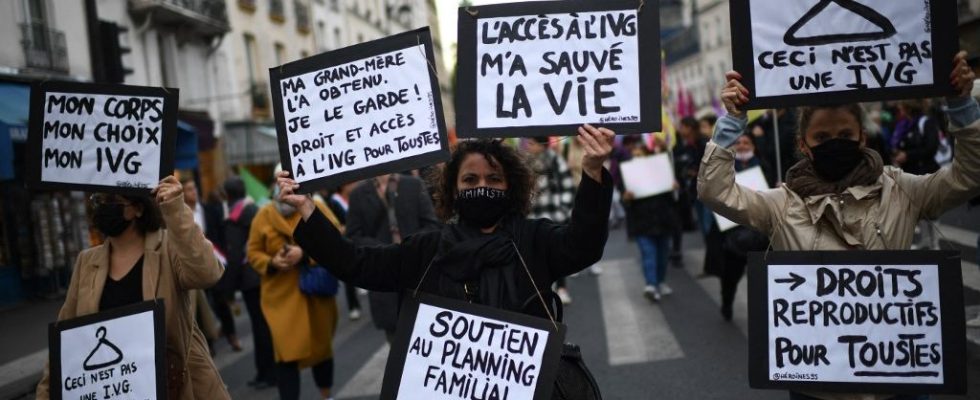“Everyone has an abortion, it has always affected all age groups,” says obstetrician-gynecologist Sophie Gaudu straight away. The fact remains that the use of voluntary termination of pregnancy is increasing in 2022. According to a Drees report (department of research, studies, evaluation and statistics), 234,300 women had abortions in France, or 7,000 more than in 2019.
A level never reached since 1990, and a figure which marks a real rebound after the Covid-19 years. Effect of extending the legal deadline, from 12 to 14 weeks since the law of March 2022? Not really, since this “extra-time” only concerns “less than a fifth of the surplus observed compared to the year 2021”, according to the report.
“It’s more a couple’s story than a women’s story”
Women aged 25 to 29 are those who resort to it the most, with 28.6 abortions per 1,000 women, according to the Drees, followed by those aged 20 to 24. “It’s linked to reproductive life,” explains Mireille Le Guen, demographer and researcher at UC Louvain. Younger, “we have less close sexual relations”, and therefore less recourse to abortion, “contrary to popular belief”. Between the ages of 20 and 30, one’s sexual life is certainly more active, but “one does not necessarily have the desire to build a family because one is already building one’s professional life,” explains the researcher.
The increase in recourse to abortion “also affects 40-45 year olds”, underlines Sophie Gaudu. An age where “some women do not get back into relationships”, indicates Mireille Le Guen. Socially, “women from precarious backgrounds have more recourse to abortion”, she specifies, citing another Drees study, because “the financial situation makes it difficult to welcome a child”, especially if it is not planned. Because behind the question of abortion, there is that of unwanted pregnancies. The increase noted in the Drees report can therefore be linked to the fall in the birth rate. “Usually, the two curves follow each other,” recalls Sophie Gaudu. But over the last three years, “there has been Covid-19, the war in Ukraine, social movements, record inflation”, in short, so many reasons to postpone the birth of a child, especially if he is not planned. “It’s more a couple’s story than a women’s story,” analyzes the gynecologist. She also cites “eco-anxiety” and the freedom to speak out about not wanting to have children. “It’s not the main reason, but the question ‘is now the time?’ circulates,” she notes.
“The number of abortions is a social concern”
Breaking another preconceived idea, Mireille Le Guen insists on the fact that “recourse to abortion does not mean that there is an absence of contraception but rather a failure of the method”. On this point, the free service advocated by the government does not “concern all methods”, she targets, noting that “access to contraception has not changed”. “There are fewer unwanted pregnancies, but when there are, there is a greater chance of resorting to abortion,” she explains. On the other hand, the rebound in abortions after Covid-19 is rather “good news, which reflects the reopening of centers”. Also highlighting the possibility for midwives to perform medical abortions, the demographer believes that “we tend to think that recourse to abortion is bad news, but it is in fact a marker of autonomy reproductive health of women.
“The number of abortions is a social concern”, adds Sophie Gaudu, “as if abortion was doomed to disappear”. However, maintains the gynecologist, as long as women become pregnant, “there are pregnancies that women will wish to terminate”. Sophie Gaudu welcomes “rather good access” in France, with “facilitating” laws for twenty years, and calls for putting into perspective the “increase in stability” in the figures from the Drees report. Out of 234,300 abortions in 2022, “compared to 2019, if we remove the 3,000 linked to the increase in delays, how much does that make?…. » Cross product in support, an increase of 1.76%.

